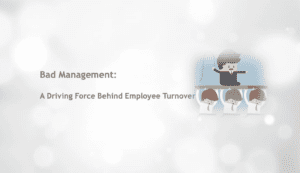Bad Management: A Driving Force Behind Employee Turnover
Employee turnover is a significant concern for organisations across industries. While there are multiple factors that contribute to an employee’s decision to leave a job, one prominent cause is bad management. A recent study conducted by the Chartered Management Institute (CMI) sheds light on the negative impact of poor management practices on employee retention and workplace culture.
The Impact of Bad Management
According to the CMI research, approximately 30% of UK workers have left a job due to a negative workplace culture. Within this group, 28% attributed their departure to a negative relationship with their manager, while 12% cited discrimination or harassment. These statistics highlight the significant influence that managers hold over employee job satisfaction and engagement.
When employees perceive their managers as ineffective, it directly affects their motivation and commitment to their work. The study reveals that one-third of employees with ineffective managers reported feeling less motivated to perform well in their roles. Furthermore, nearly half of these employees admitted to considering leaving their current position within the next 12 months. The consequences of bad management are not limited to individual employees but also impact overall organisational performance and productivity.
The Role of Accidental Managers
Interestingly, the CMI study found that 82% of new managers are “accidental managers” who have not received any formal training in management or leadership. This lack of preparation and development can contribute to ineffective management practices and a toxic work environment. Accidental managers may struggle with essential managerial skills such as communication, conflict resolution, and providing constructive feedback.
The study also revealed a correlation between management training and the recognition of poor behaviour. Among managers who had received formal training, 25% reported calling out poor behaviour, while only 15% of accidental managers did the same. This finding underscores the importance of equipping managers with the necessary skills and knowledge to effectively lead and support their teams.
Addressing the Issue
To prevent toxic work cultures from developing and to retain talented employees, it is essential for organisations to prioritise improving the performance of managers. Companies should invest in comprehensive management training programs that equip managers with the skills they need to lead effectively. These programs should cover areas such as communication, conflict resolution, performance management, and emotional intelligence.
Additionally, organisations should establish a culture of feedback and accountability. Regular feedback mechanisms, such as performance evaluations and employee surveys, can help identify areas for improvement and address concerns before they escalate. Moreover, organisations should foster an environment where employees feel comfortable reporting instances of discrimination, harassment, or poor management practices, without fear of retaliation.
The CMI study highlights the detrimental effects of bad management on employee retention and workplace culture. Poor management practices not only drive employees to leave their jobs but also negatively impact motivation and productivity. By recognising the importance of effective management, organisations can invest in training programs and support systems that empower managers to lead with competence and empathy. Addressing the issue of bad management is crucial for creating a positive work environment that fosters employee engagement, satisfaction, and long-term success for both individuals and organisations as a whole.

